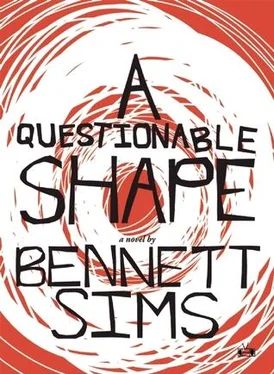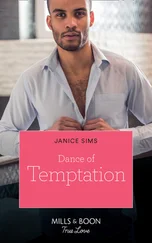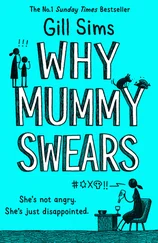But he never did moan. For a while, in fact, he didn’t do anything. He swayed there, and I stood and watched him sway. Above me a breeze passed through the oak trees’ leaves, and I watched as a current of rustle traveled up the block, live oak by live oak, in a line of thrashing branches. Eventually they reached the infected’s far white figure, overtaking him. As the branches between us swayed, their shadows swished atop the intervening concrete, and I could see that all of the street leading up to the infected was shaded: the pavement roiled with movement — with black turmoil — as if being buckled by an earthquake of shadows. Down at my feet some of its tremors swished over my shoes. And raising my eyes from my feet, moving my eyes slowly along the length of the street, one patch of thrashing shadow at a time, I could almost believe that I was following just a single tremor in motion, one black seism traveling up the block. This shockwave, beginning at my shoes, seemed to ripple outward, breaking over itself in crests and troughs until it broke over the feet of the infected. His white shape stayed in place, being lapped at by the blackness. I lifted my arm at him, as if in a wave, then actually waved both arms. He didn’t respond, and I let my arms drop to my sides. The tree shadows continued cascading toward him, in flurries of movement that threw his motionlessness into relief. Why didn’t he move? Even as he stood there, he seemed to exist on another plane. His stillness — his total unresponsiveness to everything around him: the wind, the shadows, me — seemed ghostly, as though he occupied some sublime interstice between life and death, and nothing in this world could touch him. Could he perceive any of this? There was a great vacancy in his staring. He was present, but only as the manifestation of an absence. Neither here, nor not here. Neither a brain-damaged human, nor a murderous corpse. Nor even, quite, some indeterminate mixture between the two. It seemed in that moment as if I could go on accreting neithers like this all night — as if I could stand here, all night, frozen in apophatic paralysis — and still be no nearer an understanding of what he was. Of what it would be like to be like him. 22
I remember wishing I could see his eyes. The way he was staring, he seemed to be gazing into the sublime, or at the face of Death. And so too did sublimity and Death — gazing out into our world through those eyes — seem to be seeing me. I felt something like the awe that the visitant must feel, in the presence of the archangel, or the alien, and I knew then that I would do anything to understand.
I stood opposite him for I don’t know how long, watching. And when finally he turned his back to me and departed, I watched him wander, somnolently, into someone’s front yard, where he glanced left and right in seeming disorientation before disappearing in the alleyway between two houses. Just like that. There was even this hush lingering in the air behind him.
For how many minutes did I remain there, waiting to see him again or another one? Ten, at most. Then I phoned the police and walked home. I woke Rachel coming in, and told her, when she asked where I’d been, that I wasn’t afraid of outside anymore. She was right, I said: I did need to get out of the apartment.
It wasn’t long after this that Mazoch emailed about the search.
THIS MORNING RACHEL WAKES EARLY, AN HOUR or two before she usually leaves for the shelter, and waits with me in the kitchen while I wait for Mazoch.
Last night I told her about the traces he had found (the broken window, the plaid cloth), and also about his conviction that we were ‘closing in.’ She pursed her lips and repeated, ‘Closing in.’ That was all she said on the subject, and her tone was hard to read. But I sensed there was something she wanted to say, so I was not surprised this morning when she woke with my alarm. Now, while I stand beside the toaster, I’m waiting for her to speak.
She’s been brooding at the kitchen table, her face still pale from sleep, her blond hair frazzled into an aureole. When I turn my back to her I can still feel her watching me, and so — to have something to do with my hands — I prematurely pop the toaster. I busy myself with the butter knife, frowning down at the soft slices, barely warm. When I glance back up, she is indeed still watching me. Even her pajamas are watching me: the polka-dot pants; the white tank top, semé with cartoon owls. They ocellate her body, multiplying her watching a hundredfold. Finally she clears her throat: ‘What—’ she begins. ‘What if you do find Mr. Mazoch?’
Ah. So that is what she woke so early to ask. I should have guessed. It’s not a question that I have posed, in so many words, to Matt. But it’s the very first question that Rachel posed to me, back when I initially broached the search with her. ‘He doesn’t want to kill him, does he?’ she asked. When I didn’t respond right away, she brought her hands to her cheeks: ‘Oh my God. He wants to kill him.’
At the time, I told her that I had no idea what Matt’s plans were. We hadn’t discussed them, I said, and anyway, the search was more emotionally complicated than that, for Matt. He himself probably didn’t know deep down what he was doing. Nor was it something I felt comfortable putting him on the spot about. She was making it sound as if I were knowingly abetting Matt’s Ahabism, manning the oars while he sharpened the harpoons, in some monomaniacal manhunt. When in fact the situation was much grayer, I told her.
This was all strictly speaking true. I really didn’t know what Matt was planning. We really hadn’t discussed it. And because we haven’t discussed it since, I’ve been able to continue the search in good faith. Rachel’s been able to condone it as well, so long as we both operate under the tacit assumption that it is a rescue mission: that Matt intends to commit Mr. Mazoch to a quarantine. On most days of the search, this interpretation seems viable. But then there are days — such as yesterday, at Highland Road Park — when I harbor my suspicions. Although I’ve never admitted as much to Rachel, it does seem at times as if Matt might entertain the prospect of euthanasia: that he might be driven to put Mr. Mazoch out of his misery. While I personally would advocate strongly against this (it’s illegal, for one thing; and for another, we can’t be sure that what the undead are experiencing is misery), 23I also recognize that I can go only so far in dissuading Matt. It’s ultimately his decision to make.
I have never admitted this to Rachel. Thankfully, over the past few weeks, I haven’t had to. As it began to seem less and less likely to her that we would ever actually find Mr. Mazoch, Matt’s motives ceased to be an issue. With Mr. Mazoch out of mind, Rachel has been free to conceive of the search as a purely ritual activity. When she imagines Matt and me driving around the city, it is as if we are circling an empty center, like two monks raking sand. The search is aimless, autotelic, without object. It serves its own purposes. For Matt, she imagines, it must be a ritual of mourning and memorial: he is visiting the sites of his father, so that he can reflect on the man and remember. Whereas for me, it must be a ritual of routine: it is a structured excuse for me to get out of the apartment each day, as well as a safe way of encountering the undead (to conquer my fear of them, on the one hand; and to come to understand them, on the other). We will simply perform these rituals until Friday, she imagines, and then we will be finished.
She’s not half-wrong. The search really is each of those things, for each of us. Except it is also, in its own way, a search. Rachel was able to forget this only when the search was returning no results. But now that Mazoch is actually discovering ‘traces,’ she evidently feels a burning need to know his plans.
Читать дальше












